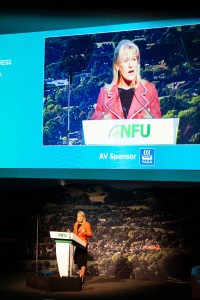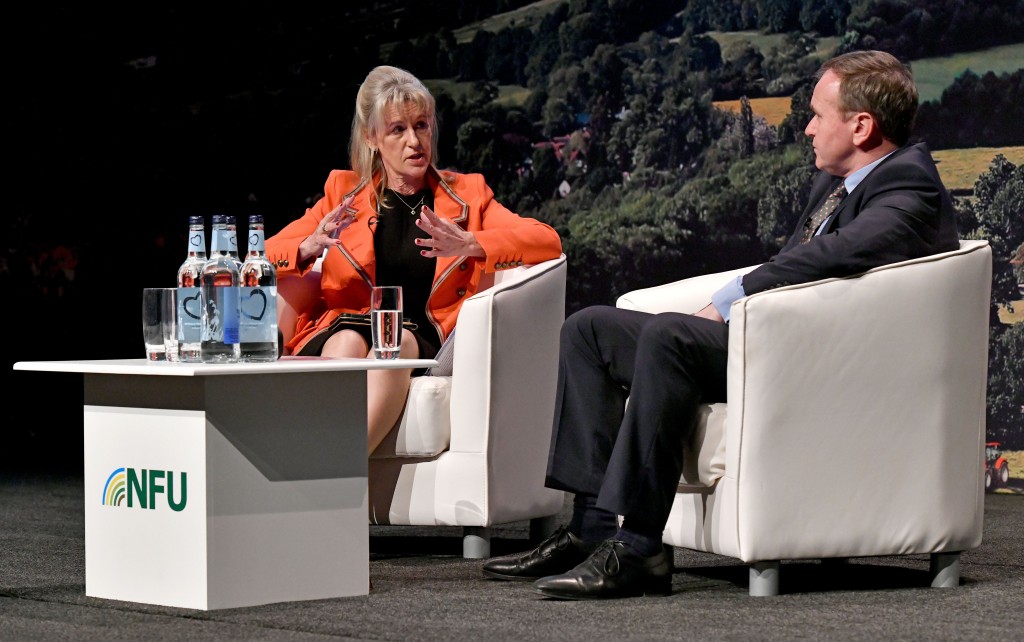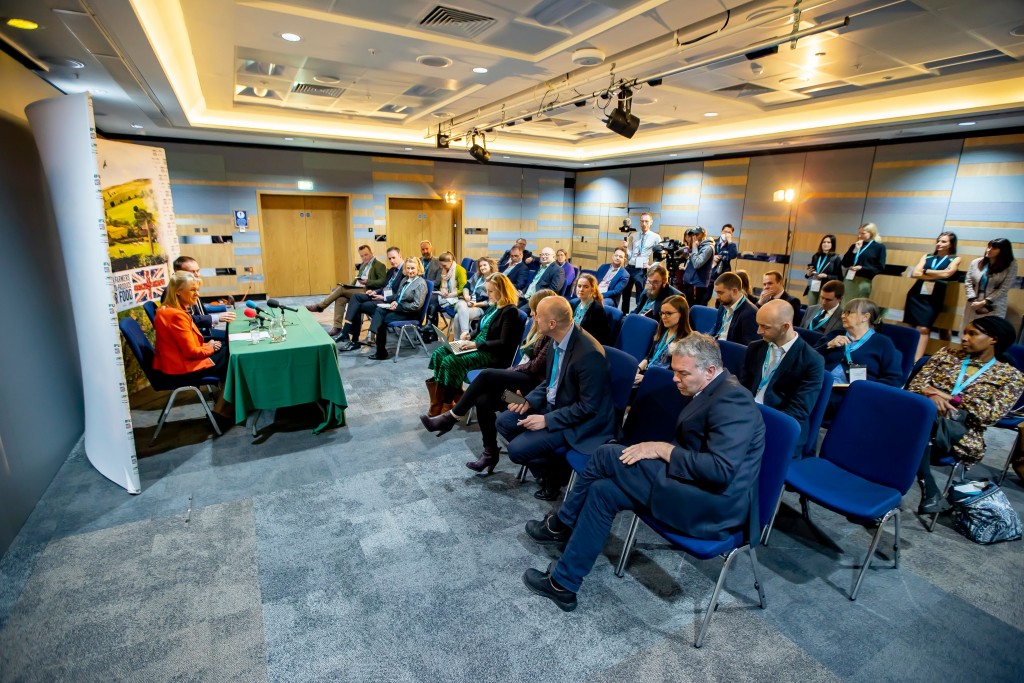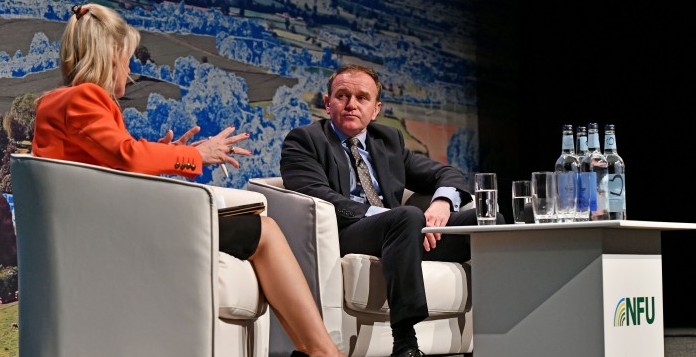Defra Secretary George Eustice endured a difficult day at the NFU conference yesterday, as he failed to provide convincing answers to impassioned questioning on the pig industry crisis.
The crisis afflicting pig farmers dominated much of the first day’s proceedings, as NFU president Minette Batters described it as a ‘disaster and a disgrace’ in her opening speech, while heart-wrenching evidence of the impact of the crisis was set out in front of the 1,000-strong audience.
Mr Eustice was repeatedly asked about the impact of Government policy on labour shortages and the subsequent backlog and whether, on the day Ireland announced a €7m pig support package for its much smaller industry, the Department would provide desperate pig producers in England with some financial support.
His answers failed to impress, as he sought to pin the blame for the crisis on China, processors and over-production and made it apparent that there is not going to be any compensation for pig producers in England – unlike in Scotland, Northern Ireland, Ireland, France, the Netherlands Belgium, Poland and other European countries.
In fact, things got so bad, as Mrs Batters expressed exasperation at Mr Eustice’s inadequate responses on this and other pressing policy issues and the Defra Secretary’s body language betrayed his discomfort, that the first question at the press conference, from Farmers Weekly’s Johann Tasker, was whether their relationship had deteriorated to the point of being unworkable.
Pre-empt crises
 In her opening address, Mrs Batters said the current situation in the pig sector ‘should have, and could have, been avoided’.
In her opening address, Mrs Batters said the current situation in the pig sector ‘should have, and could have, been avoided’.
“There are currently 200,000 pigs on contract backed up on farm. 40,000 healthy pigs have been culled and simply thrown away,” she said. “This truly is an utter disgrace and a disaster for the pig industry. This is down to the government’s poorly designed change to immigration policy and what I can only say appears to be its total lack of understanding of how food production works and what it needs.”
When Mr Eustice came to address the issue during his speech, he cited ‘disruption to the markets in China’ as the cause of the ‘very difficult time for our pig producers over the last 12 months or so’.
In what became a familiar refrain, he added uptake of Defra’s October support package by processors ‘had not been as good as we’d have liked’ and explained that Farming Minister Victoria Prentis has been ‘working very hard with the NFU and the NPA’ to improve that Private Storage Aid Scheme.
He also reiterated Defra’s intention to ‘commence a review of the pig market sector with a view to using powers in the Agriculture Act to ensure that there is fairness in the supply chain in the future’.
But during the Q&A session immediately afterwards, Mrs Batters upped the pressure, referring to a ‘heartbreaking email she received from a pig farmer on the eve of the conference.
“They have invested over £1m over the past five years. They are producing store pigs that are sold off at contract at 50kgs. They have been in business for 52 years and their son has just come back to work on the farm.
“With 200,000 pigs backed up on farms, they have taken the decision to cull 4,700 sows. Their son has to go out and find a job – what do I say to that family?” she said, before asking Mr Eustice if Defra was, like other countries, going to provide support to those farmers who are losing their livelihood purely because of post-Brexit changes to the Government’s EU migration policy.
He responded by doubling down on his insistence that, according to processors, Chinese market disruption was the main cause of the problems on farms and repeated his points about the lack of take-up for the support scheme and Defra’s intention to examine the issue of ‘transparency and fairness’ in the pig supply chain. “Crucially, this is a sector that is dominated by, really, four very large processors,” he said.
 An increasingly fired up Mrs Batters then tried to get more out of him on whether he would provide aid directly to producers.
An increasingly fired up Mrs Batters then tried to get more out of him on whether he would provide aid directly to producers.
Swerving the question, he suggested the priority was to get through the ‘one week’s kill’ of 160,000 pigs backed up on farm, which could be dealt with ‘if only those processors would press on with Saturday slaughters to get on top of this’.
“It would require farmers to take a lower price in the short term in order to clear that backlog, but that would then get the market back into balance,” he said. “We know that over the last year pig production increased by about 7% responding to increased demand and expectations for the Chinese market that did not in the end materialise.
“We know that since the autumn they’ve been scaling back their production again and so production and supply is likely to come back into balance in the early part of this summer.”
But Mrs Batters was not satisfied. “That still doesn’t do it. I don’t see how that helps in replying to that email,” she said, warning that the sow herd, already 10% down, ‘will only be contracting further’, sucking in more imports produced to lower standards. “This is far from over,” she added.
Toughest year in a generation
And it wasn’t over for Mr Eustice, either, as the topic was raised again by Sam Godfrey, producer chair of the NPA’s Pig Industry Group, when he asked his question from the floor.
“The past year has been the toughest in a generation for pig farmers, culminating in tens of thousands of healthy pigs being culled and disposed of,” he began, stressing that the backlog is of pigs contracted to processors that have not been taken.
Given the failure of support package to help, he asked whether Mr Eustice would he would add butchers to the shortage occupation list and use his powers under the Agriculture Act to compensate producers hit directly, rather than processors.
Mr Eustice again ducked the compensation question, repeating previous points. Adding butchers to the shortage occupation ‘wouldn’t actually have helped’ as processors would simply have ‘cut their pay and offered them even less’, he added.
This prompted further tetchy exchanges between the Defra Secretary and Mrs Batters, who told him the NFU and NPA had been flagging this up to Government back in April. “Were we still members of the EU, we would not be in the situation we are now. The lessons we have got to learn is that we’ve got to plan for these crises,” she said, adding that the support for Government was ‘too little, too little late’
Press conference
 The good news for Mr Eustice was that when I got to ask him my question in the press conference – trying to pin him down on financial support for producers and get him to acknowledge that Government policy on migration was, in fact, a significant cause of the crisis – it was easier than the last one he had faced (taking the positives, he had answered the question on his relationship with Mrs Batters by saying he felt he got a better reception in the hall this time than he did last time he was there two years ago).
The good news for Mr Eustice was that when I got to ask him my question in the press conference – trying to pin him down on financial support for producers and get him to acknowledge that Government policy on migration was, in fact, a significant cause of the crisis – it was easier than the last one he had faced (taking the positives, he had answered the question on his relationship with Mrs Batters by saying he felt he got a better reception in the hall this time than he did last time he was there two years ago).
On my question about compensation, he simply said the Government felt ‘the best best way to deal with this was what the NPA asked for in the autumn, to have a private storage aid scheme to deal with the backlog’.
While the pig price has gone down it has done so from a relative high point, he added, without mentioning the soaring costs of production that have been the trigger behind compensation schemes in other parts of Europe.
Mr Eustice again reiterated how the industry was struggling to cope with ‘oversupply’ and said the Government’s measures put in place in recognition that labour was a ‘potential issue’, such as the 800 temporary visas, had not been taken up as expected.
Intriguingly, he even suggested that was ‘maybe because processors decided not to access those schemes, maybe not wanting to create increased supply that might come from increased rates of butchering’, a comment that will raise eyebrows among those processors. There is, he added, a global labour shortage at the moment, so even if we had free movement of labour, attracting labour under these sorts of schemes might ‘not be the whole answer’.
While the industry is undoubtedly in a better place to tackle the backlog following the recent pig crisis roundtable, chaired by Farming Minister Victoria Prentis (and there was more encouraging sentiment in an interview at the conference with Mrs Prentis for the next issue of Pig World), Mr Eustice’s appearance at Birmingham did not inspire confidence that desperate pig producers have the fulsome backing within Government they might be expecting during their darkest hour.




